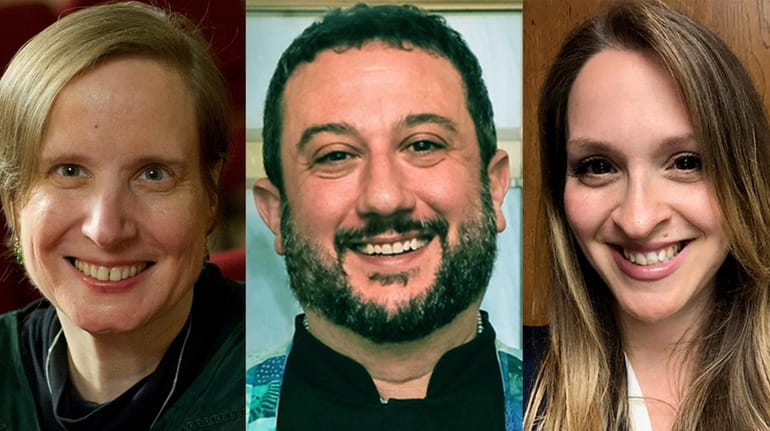Asking the Clergy: What is a common read your congregation has shared?

From left, the Rev. Valerie Freseman of First Universalist Church of Southold, the Rev. Jude Geiger of Unitarian Universalist Fellowship of Huntington and Rabbi Dahlia Bernstein of Congregation Beth Ohr. Credit: Christine Fischer; Marisa Comple; Dahlia Bernstein
Common-read experiences have become popular in some Long Island congregations as a way to bring members together to discuss important books and relevant themes. This week’s clergy discuss ongoing reading projects that explore Hebrew Scriptures, racism and the history of indigenous people.
Rabbi Dahlia Bernstein
Congregation Beth Ohr, Bellmore
For the past five years, as many as 15 members of our community have been meeting on Thursday afternoons to read through all Five Books of Moses. The group, which we call, "Context," is no ordinary Bible study class. We see Bible study as a sacred process as we compare the Torah to other near-Eastern texts. Our Jewish sages say that there are 70 faces of Torah, meaning there is an infinite amount of wisdom and understanding to be gained from every line.
We avail ourselves of both traditional and modern methods of study. We look at irregularities in the text and consult commentaries from brilliant thinkers, such as the medieval French rabbi, Rashi. Our running joke is that we can spend an entire class on just three Torah verses as we carefully examine their word use, significance and timeless wisdom.
Torah study is a process of revelation through which we begin to uncover the mysteries of our own inner existence as we journey through the sacred text that has stood the test of time. I have imagined this process of commenting on the Torah as a stone that becomes smooth through time, being handled by so many. It is eternal as well as strikingly relevant.
The Rev. Valerie Freseman
First Universalist Church of Southold
Our congregation has been reading "So You Want to Talk About Race" (Seal Press, 2018) by Ijeoma Oluo. It’s a good introduction to the hard work of examining racism in ourselves, our communities and our institutions.
This book lays out the major issues and fault lines that have impeded progress in this country for decades. Oluo frames every issue with personal anecdotes, historical and statistical analysis, and summaries that inspire individuals to action. She writes with keen insight and humor as she brings to our collective awareness the effects of white-supremacy culture on our nation.
Since August, between five and 10 people each month have been participating in our common read. (That’s a significant number for our small congregation.) We have conducted Zoom discussions, which allow me, as a facilitator, occasionally to bring in a short YouTube video to illustrate a point. Each month, we examine up to four chapters and try to draw upon our experiences to relate to the material.
We are a majority white congregation, but beyond that we have all lived in different backgrounds — some from different generations. Nevertheless, moving past the discomfort of talking about racism — not just as a personal failing but as systemic racism — is part of the work we are called to do in this book.
The Rev. Jude Geiger
Unitarian Universalist Fellowship of Huntington
Our Unitarian Universalist denomination is undergoing a multiyear discernment process around the impacts of white supremacy — which we define as the ideology and systems in place that give the lie that whiteness is superior — in our nation and our institutions.
At the congregational level, the Unitarian Universalist Fellowship of Huntington, in addition to other work, is committing to an ongoing monthly book discussion on ethics and theology written by Black, indigenous and other authors who are people of color. We are alternating between topics. We read books that address the spiritual practice of anti-racism, and how that brings us closer to spiritual wholeness and books that address specific areas of historical and present harm.
Our next common read will be "An Indigenous Peoples' History of the United States for Young People" (Beacon Press, 2019) in the hopes of better understanding how education and public policy impact how we understand our collective history. It’s hard to help our neighbor if we can’t grasp how we are complicit in ongoing harm.
In the face of our contemporary public-political environment, it is the responsibility of houses of worship to ensure our members are conscious of the ethical import of our actions and our inactions.
DO YOU HAVE QUESTIONS you’d like Newsday to ask the clergy? Email them to LILife@newsday.com.
